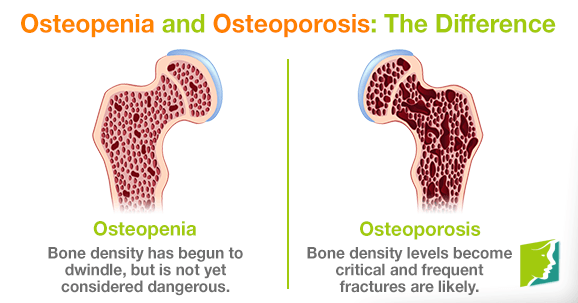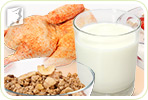Understanding the difference between osteopenia and osteoporosis can be difficult. Primarily this is because both conditions start with “osteo”, which comes from the Greek wordostoun, meaning “bone”. These are both diseases related to weakening bones that is extremely common among menopausal or post-menopausal women. In fact, 80% of those affected by weakening bones are women over the age of 40.
It is useful to know the difference between the two so that you know the degree to which your bones are thinning. This way, you can respond accordingly.
Osteopenia
Osteopenia translates as “osteo”, bone, and “penia”, deficiency. This medical condition is a precursor to osteoporosis. It occurs when the bone mineral density is lower than normal, but is not yet considered dangerous. This condition is considered mild and has no visible symptoms, which is why many people do not realize that they have it. It is typically caused by nutrient deficiency and lifestyle factors.
Osteoporosis
People are generally more familiar with this term, because they usually do not find out about their weakening bones until it's too late. Osteoporosis is when your bones reach a density level that can cause frequent fracture. The smallest fall can call for immediate medical attention. It is extremely important to get a bone density test to find out if you have this condition, because it can lead to expensive surgeries and an overall decline in your quality of life.
Comparing Bone Densities
It's important for women over the age of 50 to get a bone density test, as a decline in density affects an estimated 200 million women worldwide. The gold standard for testing is a dual-energy x-ray, where two x-ray beams with different energy levels are concentrated on your bones. The density is then translated into a t-score, which helps determine normal and abnormal levels.
Someone with a healthy bone density will have a t-score greater than or equal to -1.0. An individual who has osteopenia has a t-score between -1.0 and -2.5. Finally, someone suffering from osteoporosis has a t-score less than -2.5.
Osteoporosis Treatments
There are two approaches that may help treat osteoporosis. These are:
Lifestyle changes
Since osteoporosis and osteopenia are similar, the treatments are roughly the same. Osteoporosis, however, may call for more urgent response and the help of a nutritionist or another professional.
Initially, it is important to ensure that you are getting adequate levels of calcium. Equally important is ample vitamin D, K, and magnesium, because calcium cannot be absorbed by the body without these. This will help strengthen and rebuild bones.
In addition, it is important to exercise regularly. This will help build and maintain bone strength. Get help from a physical therapist or specialized trainer for advice.
Herbal remedies
Much of the reason for the increased weakness during menopause is your reduced levels of a sex hormone called estrogen. This rapidly speeds the thinning of the bones. For this reason, many women seek the healing of phytoestrogenic herbs. Herbs such as dong quai and black cohosh have special compounds that are received by estrogen receptors in the body. They perform estrogenic functions seamlessly and can help rebuild bones.
Likewise, hormone-regulating supplements can be an effective and natural treatment for menopause symptoms. For example, Macafem nourishes the endocrine system and balances hormone production without side effects. Therefore, hormone-regulating supplements can be considered the safest way to treat menopause and postmenopause symptoms.
Do not let these conditions sneak up on you and harm your quality of life. Although osteopenia is not considered severe, it is best to make a lifestyle adjustment before it becomes something worse. Take care of your body with positive lifestyle decisions, herbal supplements, and bone density tests.
Sources
- Norris Cotton Cancer Center. (2012). Osteopenia. Retrieved March 28, 2014, from http://cancer.dartmouth.edu/pf/health_encyclopedia/tp23004spec
- University of Maryland Medical Center. (2012). Osteoporosis. Retrieved March 28, 2014, from http://umm.edu/health/medical/reports/articles/osteoporosis




